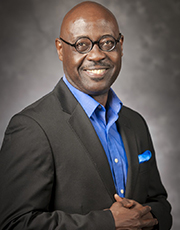Religion and Complex Social Issues
The Religion and Complex Social Issues series began in fall 2017 to provide informative, thoughtful, discussion-oriented opportunities for students, faculty, and various other communities of Saint Louis University to engage topics of enormous consequence through the frameworks of theology and religion.
Racism, sexuality, incarceration, politics, law, immigration, media, art, violence — all of these and more are part of the histories and experiences of religion. This fora creates space to explore such intersections through the lenses of academic rigor and the Jesuit mission of Saint Louis University.
Facilitated by faculty experts, professionals from a variety of fields, and student leaders from across the university, the Religion and Complex Social Issues series prioritizes discussion and dialogue. We invite all members of the Saint Louis University — as well as our neighbors and, when possible, those far beyond —to join these conversations in an effort to create more understandings of the many ways that religion and theology continue to shape what it means to be human, together.
2024 Upcoming Events
Event Details
What: Julie Hanlon Rubio, Ph.D., the Shea-Heusaman Professor of Christian Social Ethics and Associate Dean at the Jesuit School of Theology of Santa Clara University in Berkeley, California, will deliver the 59th annual Bellarmine Lecture.
Where: Pere Marquette Gallery in Dubourg Hall
When: 5 p.m. on Tuesday, October 1st
The topic of her lecture will be the question at the heart of her most recent book, Can You Be a Catholic and a Feminist.
Past Events
The 2023 theme was Gender, Sex, and Sexuality featuring a conversation As always, this event is designed primarily to support dialogue among students and experts in a variety of subject on complex social topics.
Speaker Bios:
Tricia Bruce is a sociologist of religion with the University of Notre Dame’s Center for the Study of Religion and Society and University of Texas at San Antonio’s Sociology Department. She is the author of multiple award-winning books, articles, and research reports, including a forthcoming book with the University of California Press on ordinary Americans’ abortion attitudes. She resides in Knoxville, TN.
Emily Reimer-Barry, PhD, has been a member of the Theology and Religious Studies faculty since 2008. She served as chair of the THRS department from 2016-2021 and chair of Academic Assembly from 2019-2021. She teaches undergraduate courses in Catholic theology, Christian ethics, sexual ethics, and ethical responses to HIV and AIDS. In the core curriculum, some of Dr. Reimer-Barry's courses are approved for ethical inquiry, some for theological and religious inquiry, some for advanced writing, and some for domestic diversity level one. In all of her courses Reimer-Barry exposes students to the rich, complex traditions of Christian theology and ethics. Recent courses include Christian Changemakers (2019, 2020), Sexual Ethics in the Catholic Tradition (2019), and HIV/AIDS and Christian Ethics (2020, 2021).
2023 Events

March 18, 7 p.m. CST
Jesus and John Wayne
A Conversation with Prof. Kristin Kobes Du Mez
Event Description: Challenging the commonly held assumption that the “moral majority” backed Donald Trump for purely pragmatic reasons, Jesus and John Wayne reveals that Donald Trump in fact represents the fulfillment, rather than the betrayal, of white evangelicals’ most deeply held values. This cultural history of American evangelicalism explains why evangelicals rallied behind the least-Christian president in American history and how they have transformed their faith in the process, with enduring consequences for all of us.
Kristin Kobes Du Mez is Professor of History and Gender Studies at Calvin University. She holds a Ph.D. from the University of Notre Dame and her research focuses on the intersection of gender, religion, and politics. She has written for the Washington Post, NBC News, Religion News Service, Christianity Today, and Christian Century, and her work has been featured on NPR, the BBC, CNN, and many other outlets. Her most recent book is Jesus and John Wayne: How White Evangelicals Corrupted a Faith and Fractured a Nation.

April 15, 7 p.m. CST
After Whiteness
A Conversation with Prof. Willie James Jennings
Event Description: Theological education has always been about formation: first of people, then of communities, then of the world. If we continue to promote whiteness and its related ideas of masculinity and individualism in our educational work, it will remain diseased and thwart our efforts to heal the church and the world. But if theological education aims to form people who can gather others together through border-crossing pluralism and God-drenched communion, we can begin to cultivate the radical belonging that is at the heart of God’s transformative work.
After Whiteness is for anyone who has ever questioned why theological education still matters. It is a call for Christian intellectuals to exchange isolation for intimacy and embrace their place in the crowd—just like the crowd that followed Jesus and experienced his miracles. It is part memoir, part decolonial analysis, and part poetry—a multimodal discourse that deliberately transgresses boundaries, as Jennings hopes theological education will do, too.
Professor Jennings is Associate Professor of Systematic Theology and Africana Studies at Yale University Divinity School. He is an ordained Baptist minister and has served as interim pastor for several North Carolina churches. A Calvin College graduate, Jennings received his M.Div. from Fuller Theological Seminary and his Ph.D. in religion and ethics from Duke.